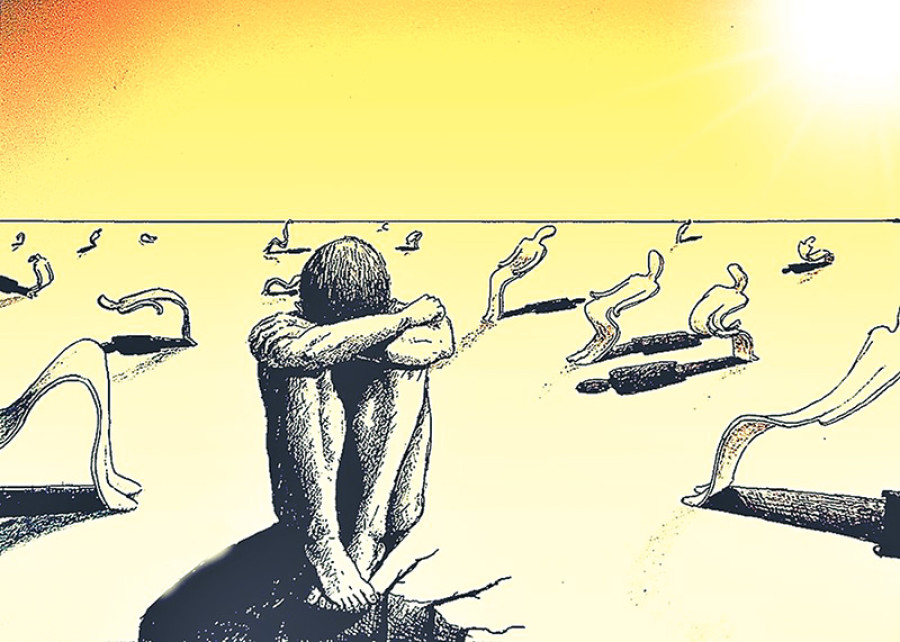Opinion
Crisis brewing
Gita Chaudhary is in her early 20s and works as domestic help in my house. A few days ago, I overheard her telling my wife that she wanted to buy a house in the city as she was tired of her landlady’s tantrums.
Dharani Kumar Sharma
Gita Chaudhary is in her early 20s and works as domestic help in my house. A few days ago, I overheard her telling my wife that she wanted to buy a house in the city as she was tired of her landlady’s tantrums. My wife asked her if she would be able to afford it because everything was so expensive. Gita replied that she was planning to send her husband abroad as a migrant worker. Listening to them, I was baffled. Many young men in rural parts of the Tarai have left their farms to work at construction sites while they send their wives to work as domestic help in rich people’s homes.
Consequently, farm work has fallen on the shoulders of elderly people who are incapable of such strenuous activity. It is distressing to observe farm lands lying barren while many Tarai districts are increasingly turning into food deficit areas. This is not only a setback for development efforts but also the goal of being self-sufficient in at least agricultural products.
Pushed out
Declining rainfall, decreasing river discharge and the deteriorating potential of river floods to naturally restore soil fertility have made farming a low return occupation. The country’s young people have evidently perceived that farming will not help them to achieve comfortable and prosperous lives. They are even more frustrated by the government’s negligence towards farming and farmers’ plights. There are almost no plans or policies to pull agriculture out of the quagmire it is currently in. If there is any plan to improve agriculture, it exists only on paper. Whatever success stories there might be in the farm sector is the result of individual efforts. Other people who try to emulate these trailblazers will find it next to impossible.
Compelled and exasperated, young people are abandoning their villages en masse and moving to the cities or foreign countries, leaving behind a young wife and small kids. They do not expect to realise their dream of a higher standard of living no matter how hard they work in their villages. This belief is pushing economically active manpower out of the country despite their knowledge that life in an alien land is uncertain and insecure. Stories of deception, fraud, torture, inhuman and harsh working conditions, and lack of payment in migrant worker destinations have long been circulating widely.
Failed leadership
At home, children and wives wait expectantly for remittance to arrive. Sometimes, they receive the dreaded message that their bread earner has been imprisoned or hospitalised, or worse, that he has died. Many families are said to have broken apart as a result. The future of the children has become uncertain, and many of them are often left to fend for themselves. Traditional values and norms regarding the sanctity of the institution of the family seem to be fading fast. Silence and inaction of the people in power towards such serious problems has caused consternation among people in the country.
The government, civil society and the intelligentsia continue to slumber. We are sure to pay a heavy price for the lack of sensitivity and accountability on the part of the concerned bodies. Seeing abandoned houses in once vibrant villages, one cannot help wondering whether foreign employment is the only option left for young Nepalis. We do not seem to realise that the land is rich enough to provide a better life to many if farming methods and technology are improved. We seem to be on the brink of moral and ideological bankruptcy which points to a complete failure of leadership.
Currently, the young generation is under the unprecedented pressure of consumerism brought about by mass production in the developed world, and lack of jobs and income in their own country. And it is not possible for all to resist the charm of material goods. With all kinds of merchandise flooding the market, disparities in society have become increasingly conspicuous. There is family and societal pressure to earn quick money to satisfy the desires of family members. Hunger and the market are shaping and guiding the people and their ideas. Even school children are reported to have settled on the option of foreign employment if they cannot do well in their studies and get a good job in the country. This points to a very alarming situation for the country in the years ahead, but no one seems to have given a thought to this potential socio-economic ruin.
Sharma is a professor of geography at Mahendra Multiple Campus, Dang




 9.89°C Kathmandu
9.89°C Kathmandu










